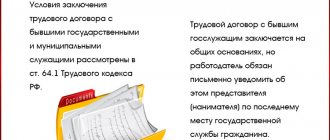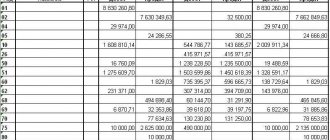Stress interview - what is it?
The term “stress interview” for employment or “stress interview” appeared in security agencies in the middle of the last century as a way to test the competence of personnel.
Of course, employees of military and departmental institutions had to demonstrate coldness and perfect composure in their work.
Today, it is not spies and intelligence officers who face stress interviews, but ordinary employees who will often be put in a stressful situation during their work.
This type of interview can be conducted in different ways: as a rule, we are talking about categorical and sometimes even tough questions, about the use of methods of psychological pressure, about placing the candidate in an unusual and uncomfortable situation.
In rare cases, personnel workers act in addition to words: there are precedents with a glass of water being “randomly” poured onto a suit, etc. All this is done not to humiliate the candidate, but to see his natural reactions under stress.
If in a normal situation many people tend to have a “cool head” and restraint, then everyone’s reaction to surprises or pressure is different. It is this reaction that the HR specialist is interested in. In simple terms, he wants to see the true face of the applicant.
If the employer doesn’t go into his pocket for a word, even a classic of the genre
Stress interview questions are usually scandalous. They should be used only in very rare cases, when a potential employee must be very resistant to a variety of situations, including a meteorite falling into the office. We recommend that you familiarize yourself with an example of topics for a stressful interview:
The candidate's shortcomings, and those that are visible to the naked eye. Provided you have a sense of tact (or lack thereof), you can make fun of shortcomings not only in professional qualities, but also in appearance and clothing style. For example, if there is at least one unironed cuff on a shirt, you can squint and ask whether irons have been banned in the country.
Reasons for leaving previous jobs.
Personal life of a job seeker. Attention should be focused on points that have absolutely no connection with the place of work. Amount of children? Great, you can ask why the applicant had to have so many children. Was there a second marriage? Even better, this is a reason to delve into the reasons for breaking up with your first partner.
Read more: Who pays for the medical examination when applying for a job?
Typical stressful issues should also not be put off until later. It would be a good idea to ask the following questions:
- What a potential employer can offer to the company he is going to work for, is it worth hiring him and why.
- What situations most clearly express the positive qualities of the candidate.
- What salary does this person deserve and why does he think that this salary is right for him?
- How long will it take for a candidate to make a tangible contribution to the development of the company.
- What would the applicant answer to the employer if his answers to the questions were considered “bland” and of no interest?
In conclusion, the correct behavior for a potential employee is to be polite, even if frowning. If politeness has abandoned the interviewee, this is a surefire reason to leave his resume in the trash. The choice of stress interview methods should depend on the degree of tension of the position. The higher the degree, the more stages of the interview should be used.
Didn't find the answer to your question? Find out how to solve exactly your problem - call right now:
+7 (Moscow) +7 (St. Petersburg)
Employers want to see among their employees not only competent specialists, but also stress-resistant people. In our nervous and turbulent times, this criterion when hiring is simply necessary. It is for these purposes that a stress interview is conducted.
Who is at risk?
If your job is to sort through papers, then no one will put you in a stressful position.
For those who apply for vacancies related to communicating with people and carrying out constant, and often unsystematic, communication, an HR specialist will definitely prepare a stress survey.
This group includes company secretaries and office managers, sales managers and PR specialists; HR specialists themselves, journalists, department heads, call center operators, insurance agents.
Personal assistants to bosses are also required to undergo this procedure. That is, if you are required to be able to handle stress when applying for a job, be sure that it will be tested during a stress interview.
What does it look like?
A picture may appear with a lamp pointed at you. No, this, of course, does not happen.
Typically, hiring takes place in the usual way: they ask you to fill out paperwork, begin a regular interview with basic questions about your resume and work experience.
The stressful part can start at any of your answers:
- personnel officers may begin to react disapprovingly to your stories, doubt your competence, or even even discuss your appearance, manner of speaking, choice of words;
they may ask again, be skeptical about what was said, get distracted and do other things, pointedly ignoring you;
- Some companies welcome particular sharpness in questions: “Why did you even come?
Who told you that you deserve to work in our company? This is not done to hurt or offend, but to see how you can cope with this kind of aggression. Exactly the same aggression sometimes awaits an employee on behalf of clients, so this is a way to prepare a person for the worst; - there is a “panel interview” method - an employee begins an interview with one personnel officer, then a second one “accidentally” joins and starts the question from the beginning, then a third may come - this is a good test of the candidate’s patience, as well as his honesty.
Now that we've learned a little more about stress interviews, sample questions are the next important topic that we'll cover in the section below.
How to test your stress tolerance at an interview?
The next stage is the interview itself. Needless to say, you can artificially create the necessary atmosphere in your office?! In the summer, you can completely close all the windows and turn off the air conditioning, and in the winter, on the contrary, open the windows wide open, and more than one. The cigarette smoke test works well - in a smoky room it becomes difficult to breathe and it becomes more difficult for potential employees to answer your tricky questions. Below are the main methods used during a stressful interview.
How do I pay the state fee for registering an LLC? Click on the link.
Which legal address to choose for registering an LLC? For more information, read the article.
The method of “unequal forces”. Do potential employers enter your office one at a time? Great. But who said that the interviewer should also be alone? The “unequal power” method involves several people asking questions who are inconveniently located in relation to the candidate. Two people should be located on the sides, and one will certainly be behind the back. This method is an excellent test of equanimity. Does a person spin around even when no questions are asked? He's definitely not right for you.
Long call to colleagues, partners, family. During the conversation itself, discussing previous jobs, salaries and the best qualities of the candidate, you can afford to call and drag out the conversation for a good 20-30 minutes. In this case, you can get up from your seat, start walking around the room, or even better, stand behind the interviewee and start walking back and forth.
Stress interview: sample questions
Questions on stress resistance at an interview are divided into blocks: this could be a request to imagine yourself in an unpleasant situation, sharp personal questions, as well as logical questions.
- The latter, for example, includes “why are sewer manholes round?” You are not expected to give a specific answer in this situation, and if you tell a coherent and interesting version of yourself, then everything will go well.
Stressful situations include the favorite among many personnel officers, “sell me this thing,” or questions about the real solution to this or that difficult situation: “What will you do if you make coffee for a client, and he doesn’t like it so much that he will he splash it in your face?
The test subject’s task here is not to lose face and give an honest and calm answer.- Personal questions can be about anything: “Why are you wearing a tie that color?
Take off your glasses. Why do you wear them if you can take them off so easily at the first request? Why were you fired? What was your boss like? Who was a client of your previous company, name a few.” Questions like this are designed to throw you off balance, and if this happens, the interview will be a failure.
What does this give?
An employee is tested in practice - in a resume and at an interview, almost anyone is able to show their best side, carefully answering the HR employee’s questions and saying what is required. In a stressful interview situation, you won’t be able to prepare – character is visible here.
One person will shut down when asked harsh questions, another will begin to react aggressively, a third will burst into tears, a fourth will slam the door. And only a few will “go into a rage” and deftly parry or remain perfectly calm and reasonable.
It is precisely such people, capable of improvisation and maintaining a cool head, that are needed in companies that organize such competitions. After spending up to half an hour with a person, the personnel officer will know as much about him as he would have learned in weeks or months of work.
That is, a stress interview is a quick way to assess the qualities of an applicant, his psychotype and character, as well as his compliance with the company’s philosophy of thinking.
How to react and behave
To make your interview successful, be sure to remain calm in any situation. Don’t take everything to heart, because this situation is a game. Therefore, you should not succumb to provocations and stress.
If you are asked for unknown reasons to wait a long time for the event to start, then indicate that you are limited in time and do something useful.
When presented with a large number of tests and surveys, be sure to answer them. Before doing this, check what time frames exist.
It is strictly forbidden to argue with the leader or get into his personality. If you are constantly interrupted or rude, then remain calm and answer the question specifically and competently and confidently. Communication should take place, no matter how difficult it may be, respectfully and only in a professional manner.
Don't be afraid to say no when discussing your personal issues. After all, you came to get a job, and not to have a heart-to-heart talk about your personal life. You can also turn everything into a joke, or direct it in a positive direction for future work.
If you are uncomfortable communicating under the conditions provided, please let the interviewer know.
In addition, if you think that the person conducting the interview is overstepping boundaries, feel free to leave.
If, after the end of such a tense interview, they do not apologize to you for such a stressful situation, then this is a reason to think about the fact that this is the norm for this company (See Employers are scammers). Do you need to work there? After all, it is the attitude towards employees that can be noticed even at the initial stage of acquaintance.
Stress interviews are becoming increasingly popular among job interview types. This unexpected event obliges you to be prepared for it in advance. By behaving correctly in tense situations, you can get the coveted position.
Hiring tools change from year to year and become increasingly unpredictable for job seekers.
The “stress interview” observed by Western colleagues is very popular with employers because it allows them to see the candidate outside his comfort zone.
Let’s figure out what type of hiring this is, and how to get through it without “breaking down.”
Dear readers! Our articles talk about typical ways to resolve legal issues, but each case is unique.
If you want to find out how to solve your particular problem, please use the online consultant form on the right or call. It's fast and free!
Is it effective?
Here we must understand that the answer depends on the methods.
If uncomfortable but correct questions are asked, then yes, everything is effective, and the candidate will not want to run away from you if you like him.
If you asked unexpected questions on erudition, and the person coped brilliantly, then you get a competent and stress-resistant employee.
If you use personal pressure, throw out water, and behave incorrectly, then the person may not only leave, but also tell a lot of unpleasant things about your company. Therefore, moderation and general human laws of decency are the key to success.
Stress interviews are a fast, dynamic and easy-to-use recruiting method. The main point of a stress interview is to identify from among all the candidates those who can best cope with possible problems at work. However, you need to remember tact and not cross boundaries, so that those you like don’t run away from you.
Is testing legal when applying for a job?
Testing each candidate is a completely legal activity. If any of the applicants is categorically against passing this test, he may well refuse it.
But the chances of him getting the desired position will become almost zero. It is likely that the employer will not even want to talk to such a candidate during an interview.
However, refusal to test or poor results cannot be a reason for refusing a potential applicant.
The employer will have to come up with another reason for not hiring him.
Among the most popular:
- Insufficient level of professional skills.
- There is a more suitable candidate for this position.








